The Unusual Symptom That Could Signal Thyroid Trouble
Thyroid disorders affect an estimated 20 million Americans, with up to 60% unaware of their condition. The thyroid gland, a small butterfly-shaped organ in the neck, plays a crucial role in regulating metabolism, energy, and overall hormonal balance. However, because its symptoms are often subtle or mimic other conditions, many cases go undiagnosed until significant issues arise. Early detection is challenging, making it important to recognize even unusual or overlooked symptoms that could indicate a thyroid problem (Endocrine Society).
1. Persistent Hoarseness
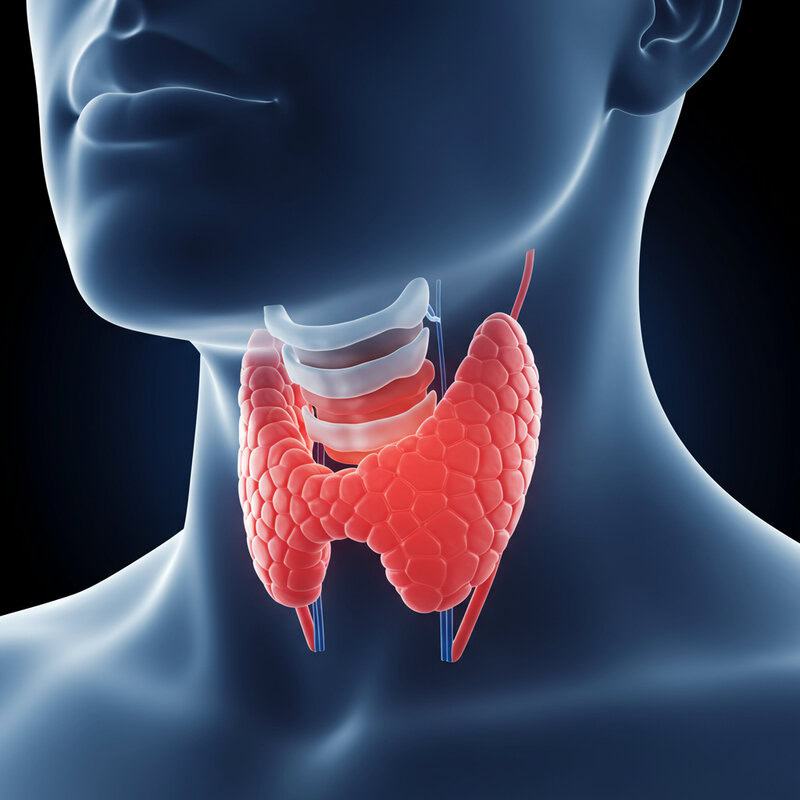
One unusual but significant symptom of thyroid dysfunction is persistent hoarseness. The thyroid gland sits at the base of the neck, adjacent to the vocal cords. When the gland becomes enlarged due to conditions like hypothyroidism, hyperthyroidism, or thyroid nodules, it can press on the laryngeal nerves, leading to ongoing voice changes. For instance, a 43-year-old woman featured in a case report from the National Institutes of Health experienced raspy, weak speech for months. Despite treatments for allergies and acid reflux, her hoarseness persisted until an ultrasound revealed a large thyroid nodule compressing her vocal cords. After thyroid evaluation and intervention, her voice gradually returned to normal. This example underscores the importance of not dismissing chronic hoarseness as a minor issue—especially if it lasts longer than two weeks. According to the American Academy of Otolaryngology, persistent changes in voice may indicate underlying thyroid trouble and should prompt a thorough medical evaluation. Early detection can lead to appropriate management and potentially prevent more serious complications.
2. Unexplained Itchiness

Chronic unexplained itchiness can be a surprising symptom of thyroid dysfunction. Thyroid hormones play a vital role in maintaining healthy skin by regulating cell turnover and moisture balance. When hormone levels are off—either too high or too low—skin can become dry, sensitive, and increasingly itchy. For example, a 36-year-old office worker reported months of relentless itching on her arms and legs, despite using moisturizers and changing soaps. After consulting a dermatologist and ruling out allergies and eczema, she was referred to her primary care physician, who ordered thyroid function tests. The results confirmed hypothyroidism as the underlying culprit.
If you experience persistent itchiness that does not respond to typical skin care or allergy treatments, it may be worth considering a thyroid evaluation. According to the British Thyroid Foundation, ongoing skin changes—especially when accompanied by other symptoms like fatigue or hair loss—should prompt thyroid hormone testing. Identifying and treating thyroid imbalance can often resolve the skin discomfort and prevent further complications.
3. Sudden Hearing Loss

While less commonly recognized, sudden hearing loss can occasionally be linked to thyroid disorders, particularly hypothyroidism. Thyroid hormones are essential for the normal development and function of the auditory system. When these hormone levels drop, individuals may experience changes in hearing, including muffled sounds or even rapid hearing loss. Research published in the Journal of Otology has documented cases where patients with untreated hypothyroidism developed hearing impairment, which in some instances improved with thyroid hormone replacement therapy.
This is distinct from more common causes of hearing loss, such as ear infections, aging, or exposure to loud noises. The difference lies in the sudden nature and lack of obvious external cause. Imagine a middle-aged adult who wakes up one morning unable to hear out of one ear, despite no history of ear problems or recent exposure to loud environments. When such a scenario occurs, it is crucial to seek immediate medical attention. According to the National Institute on Deafness and Other Communication Disorders, sudden hearing loss should always be evaluated urgently, as early diagnosis and treatment—whether thyroid-related or not—can greatly improve the chances of recovery.
4. Puffy Face in the Morning

A puffy or swollen face upon waking can be a subtle but telling sign of thyroid trouble, particularly hypothyroidism. When thyroid hormone levels are low, the body’s metabolism slows, leading to fluid retention and swelling in various tissues—most noticeably in the face and around the eyes. This type of swelling, known as myxedema, may be especially prominent in the morning due to overnight positioning and fluid shifts.
Consider the case of a 50-year-old woman who noticed her face appearing unusually puffy each morning, with swelling subsiding as the day progressed. Despite trying changes in diet and sleep habits, the symptom persisted. After her physician ordered thyroid tests, she was diagnosed with hypothyroidism. Once treatment began, her morning facial puffiness gradually resolved.
If you regularly experience unexplained facial swelling—particularly if it is worse in the morning and accompanied by other symptoms such as fatigue or weight gain—it is important to consult a healthcare provider. According to the American Thyroid Association, facial puffiness can be a key indicator of underlying thyroid dysfunction and warrants further evaluation.
5. Loss of Eyebrow Hair

Loss of eyebrow hair, particularly from the outer third, is a distinctive and sometimes overlooked symptom of thyroid dysfunction, most notably hypothyroidism. Thyroid hormones play a key role in hair follicle health and normal hair growth cycles. When these hormones are lacking, as in hypothyroidism, hair follicles can enter a resting phase prematurely, leading to thinning or loss of hair. This effect is often most visible in the delicate hairs at the ends of the eyebrows, a phenomenon sometimes referred to as “Queen Anne’s sign.”
Unlike typical hair shedding—which occurs all over the scalp and is often temporary—eyebrow thinning linked to thyroid issues tends to be persistent and localized. For instance, a person might notice that the tails of their eyebrows are becoming sparse over several months, despite no changes in grooming habits or exposure to irritants. According to the British Thyroid Foundation, monitoring the condition of your eyebrows can provide an early clue to thyroid health. If you observe this subtle change, especially in combination with other symptoms like fatigue or dry skin, it’s advisable to seek thyroid testing.
6. Slow or Slurred Speech

Slow or slurred speech is a lesser-known symptom of thyroid hormone deficiency, particularly in cases of untreated hypothyroidism. Thyroid hormones are vital for the normal function of nerves and muscles, including those responsible for articulation and clarity of speech. When these hormones are in short supply, patients may experience changes in the tone, pace, and clarity of their speech. This can manifest as unusually slow, drawn-out sentences or subtle slurring of words.
Imagine speaking with a mouthful of thick peanut butter—your words may sound heavy and effortful. This real-life analogy describes how some patients feel when their thyroid is underactive. In one case, described in an article from the Journal of Neurosciences in Rural Practice, a patient presented with speech that was noticeably slow and difficult to understand. Further testing revealed severe hypothyroidism, and her speech returned to normal after appropriate hormone replacement therapy.
If you or someone you know develops persistent changes in speech, especially in the absence of other neurological symptoms, it is crucial to seek a medical evaluation. As highlighted by the American Thyroid Association, timely diagnosis of thyroid-related speech changes can lead to effective treatment and symptom resolution.
7. Unusual Menstrual Changes
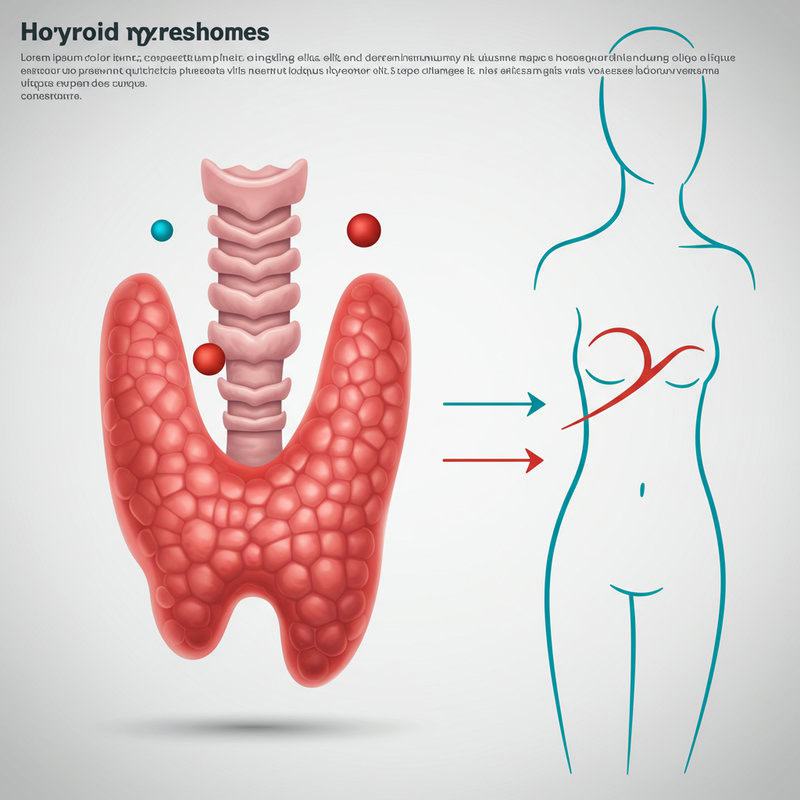
Thyroid hormones are intricately linked to the reproductive system, and their imbalance can cause unusual menstrual changes in women. Both hypothyroidism and hyperthyroidism can disrupt the normal menstrual cycle. Hypothyroidism often results in heavier, more prolonged periods (menorrhagia), while hyperthyroidism may cause lighter, shorter periods or even missed cycles. This occurs because thyroid hormones influence the pituitary gland’s secretion of reproductive hormones, affecting ovulation and the uterine lining.
Menstrual changes can arise from many hormonal causes, such as polycystic ovary syndrome (PCOS), perimenopause, or stress. However, when cycle irregularities are accompanied by other signs of thyroid trouble—like weight changes, hair loss, or fatigue—it’s important to consider thyroid dysfunction as a possible factor. For example, a woman experiencing periods that suddenly become much heavier or lighter, with no other explanation, could be showing early signs of a thyroid disorder.
The Office on Women’s Health recommends seeking medical advice if you notice marked changes in your menstrual cycle, especially if they persist for more than a few months. Simple blood tests can determine if your thyroid is contributing to the issue and guide appropriate treatment.
8. Brittle Nails with Ridges

Brittle nails with ridges are another overlooked indicator of possible thyroid dysfunction. Thyroid hormones are essential for healthy cell growth and protein synthesis, both of which contribute to strong, smooth nails. When the thyroid is underactive (hypothyroidism) or overactive (hyperthyroidism), the nail matrix can be disrupted, resulting in nails that are weak, dry, and prone to splitting or peeling. Vertical ridges—raised, linear lines running from the base to the tip of the nail—may also become more pronounced.
Common visual cues include nails that break easily, appear dull, or develop a rough texture. In some cases, you may notice horizontal grooves (Beau’s lines) or a slight yellowing of the nail plate. For example, a person with untreated hypothyroidism might find that their nails have become so fragile that they split even with gentle pressure, while also noticing deep vertical ridges and a lack of natural shine.
The American Academy of Dermatology suggests monitoring your nails for persistent brittleness, unusual ridges, or color changes. If these nail issues are present alongside other symptoms like fatigue or hair thinning, it’s wise to consult a healthcare provider and consider screening for thyroid disease.
9. Sensitivity to Cold or Heat

Thyroid hormones play a fundamental role in regulating the body’s metabolism and, subsequently, its ability to maintain a stable internal temperature. When thyroid hormone levels are low (hypothyroidism), the metabolic rate slows down, causing the body to conserve energy and produce less heat. This often leads to an unusual sensitivity to cold, where individuals may feel chilled even in warm environments or require extra layers of clothing. In contrast, excessive thyroid hormones (hyperthyroidism) ramp up metabolism, causing increased heat production and a persistent sensitivity to heat, with symptoms like excessive sweating and discomfort in warm weather.
For example, someone with hypothyroidism might find themselves shivering at the office while colleagues are comfortable, whereas a person with hyperthyroidism could experience frequent hot flashes or night sweats even in mild temperatures. According to the National Institute of Diabetes and Digestive and Kidney Diseases, these temperature sensitivities are classic warning signs of thyroid imbalance and should not be ignored.
If you notice ongoing intolerance to cold or heat, especially when accompanied by other symptoms like fatigue, weight changes, or mood shifts, speak to your healthcare provider about thyroid testing to rule out or confirm a hormonal issue.
10. Unexpected Weight Fluctuations

The thyroid gland is a key regulator of metabolism, controlling how quickly the body converts food into energy. When thyroid hormone production is disrupted, it can lead to unexpected weight fluctuations that do not correspond to changes in diet or physical activity. Hypothyroidism, or an underactive thyroid, slows metabolism and often causes gradual weight gain—even if eating habits remain unchanged. Conversely, hyperthyroidism speeds up metabolism, leading to sudden, unexplained weight loss despite a normal or even increased appetite.
For example, a person with hypothyroidism may notice they are gaining several pounds over a short period, struggling to lose weight, or feeling bloated and sluggish. On the other hand, someone with hyperthyroidism might experience rapid weight loss, muscle wasting, or increased hunger without obvious reason. According to the National Institute of Diabetes and Digestive and Kidney Diseases, such unexplained changes should be evaluated, especially if they occur alongside other symptoms like fatigue, mood changes, or changes in heart rate.
If you observe abrupt or persistent weight changes that don’t respond to lifestyle adjustments, consult your healthcare provider. A simple blood test can help determine whether your thyroid is responsible, enabling timely treatment and improved well-being.
11. Muscle Weakness or Aches

Muscle weakness or aches are frequently overlooked symptoms that can be linked to thyroid dysfunction. Both hypothyroidism and hyperthyroidism can affect the muscles, but they do so in different ways. Hypothyroidism often leads to generalized muscle stiffness, cramps, and a sensation of heaviness, particularly in the shoulders, arms, and legs. Hyperthyroidism, on the other hand, may cause muscle wasting and fatigue, especially in the upper arms and thighs. These symptoms result from metabolic imbalances that disrupt normal muscle function and repair.
Unlike the soreness that follows intense exercise, thyroid-related muscle symptoms tend to be persistent, occur without physical exertion, and may even worsen over time. For example, a person might notice difficulty climbing stairs, rising from a chair, or carrying groceries, despite no recent increase in activity levels. In some cases, muscle aches may be accompanied by joint pain or swelling.
The American Thyroid Association advises that unexplained, ongoing muscle weakness or pain deserves medical evaluation, particularly if it interferes with daily activities or is accompanied by other symptoms of thyroid dysfunction. Simple blood tests can help pinpoint the cause and guide appropriate treatment.
12. Frequent Constipation

Frequent constipation can be a notable symptom of hypothyroidism due to the hormone’s direct impact on the digestive tract. Thyroid hormones help regulate the speed of many bodily processes, including gut motility. When levels are low, the muscles lining the digestive tract contract less often and less forcefully, slowing down the movement of stool. This can cause infrequent, hard, and difficult-to-pass bowel movements, regardless of dietary or fluid intake.
Consider the example of a 45-year-old man who struggled with persistent constipation for several months. Despite increasing fiber, water intake, and exercise, he found little relief. After visiting his physician and discussing additional symptoms—such as fatigue and dry skin—he was tested for thyroid function. Results revealed underlying hypothyroidism, and treatment led to significant improvement in his digestive issues.
According to the EndocrineWeb, chronic constipation that does not respond to typical lifestyle changes should prompt consideration of thyroid testing, especially if accompanied by other signs of thyroid imbalance. Early diagnosis and treatment can help resolve constipation and prevent further complications related to slowed metabolism.
13. Trouble Concentrating
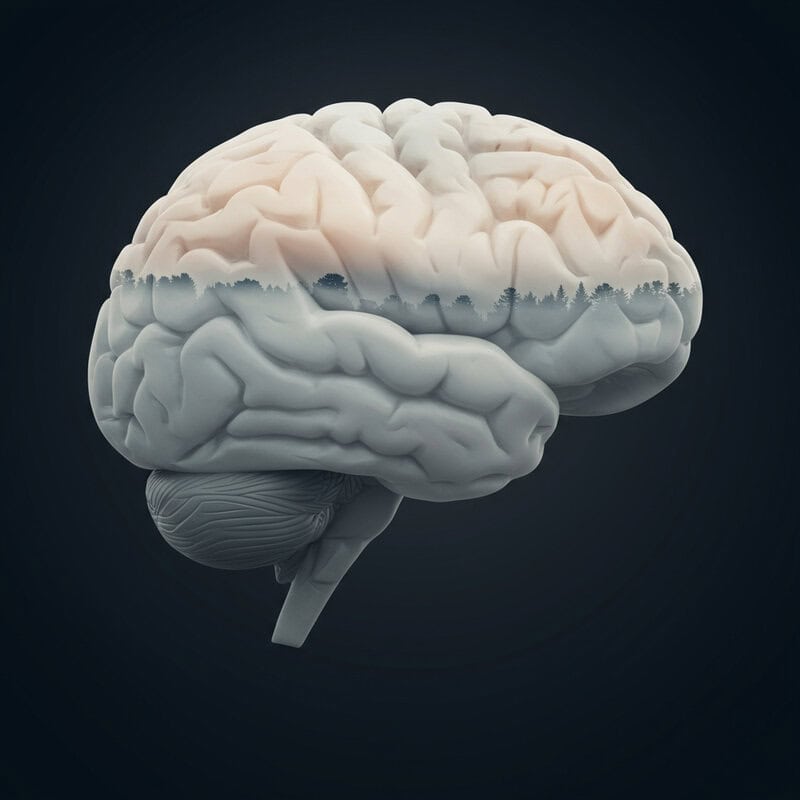
Trouble concentrating—sometimes described as “brain fog”—is a common but often underestimated effect of thyroid dysfunction. Both hypothyroidism and hyperthyroidism can disrupt cognitive processes, leading to difficulties with attention, memory, and problem-solving. Hypothyroidism typically causes slowed thinking, forgetfulness, and trouble focusing, while hyperthyroidism may lead to difficulty concentrating due to anxiety or restlessness.
This mental sluggishness differs from normal forgetfulness that everyone experiences occasionally, such as misplacing keys or forgetting an appointment. With thyroid-related cognitive symptoms, the impairment is more persistent and can interfere with work, daily tasks, and relationships. For example, a teacher with hypothyroidism might find herself unable to remember lesson plans or keep track of classroom activities, despite being well-prepared and organized. Over time, these issues can lead to frustration and decreased quality of life.
The American Thyroid Association recommends seeking medical attention if you notice ongoing difficulties with concentration, memory, or mental clarity that cannot be explained by stress, lack of sleep, or aging. A simple blood test can reveal whether thyroid imbalance is contributing to your symptoms, allowing for timely treatment and cognitive improvement.
14. Dry, Flaky Skin

Dry, flaky skin is a classic yet sometimes overlooked sign of thyroid imbalance, especially hypothyroidism. Thyroid hormones are essential for maintaining healthy skin by regulating cell turnover and supporting proper hydration. When hormone levels drop, the skin’s ability to shed dead cells and retain moisture is impaired, resulting in rough, cracked, or scaly patches that are unresponsive to typical moisturizing products.
This kind of skin dryness is distinct from more common causes such as environmental exposure (like cold weather), dehydration, or the use of harsh soaps. While these triggers usually cause temporary dryness that improves with moisturizing or changes in routine, thyroid-related skin changes tend to be persistent and widespread. For instance, a person with hypothyroidism may notice thickened skin on the elbows, knees, or shins and increased flakiness on the face or hands, even with diligent skin care.
The American Academy of Dermatology suggests monitoring for dry, rough skin that does not improve with standard treatments, particularly if accompanied by other signs of thyroid dysfunction such as hair loss or fatigue. If these changes persist, it is important to consult a healthcare provider for possible thyroid evaluation.
15. High Cholesterol Levels
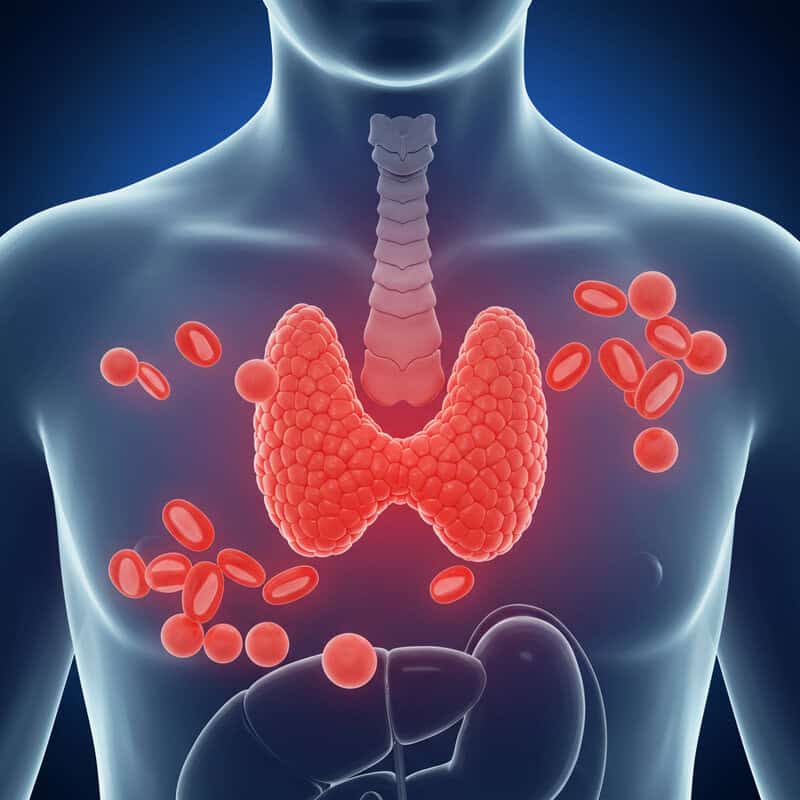
High cholesterol levels can be a silent indicator of underlying thyroid dysfunction, particularly hypothyroidism. Thyroid hormones are vital for the metabolism of fats in the liver, helping to break down and remove excess cholesterol from the bloodstream. When thyroid function is low, this metabolic process slows, leading to elevated LDL (“bad”) cholesterol and sometimes total cholesterol, despite a healthy diet and lifestyle.
For example, a 52-year-old man with no family history of heart disease was surprised when a routine blood test revealed significantly elevated cholesterol levels. He exercised regularly and ate well, yet his cholesterol continued to rise. After further evaluation, his doctor discovered mildly elevated TSH and low thyroid hormone levels, confirming hypothyroidism as the cause. With appropriate thyroid hormone replacement, his cholesterol levels improved dramatically.
The Endocrine Society recommends that anyone with unexplained or stubbornly high cholesterol—especially if accompanied by symptoms like fatigue or weight gain—should have their thyroid function evaluated. Early detection and treatment of hypothyroidism can not only normalize cholesterol but also reduce long-term cardiovascular risks.
16. Swollen Neck (Goiter)
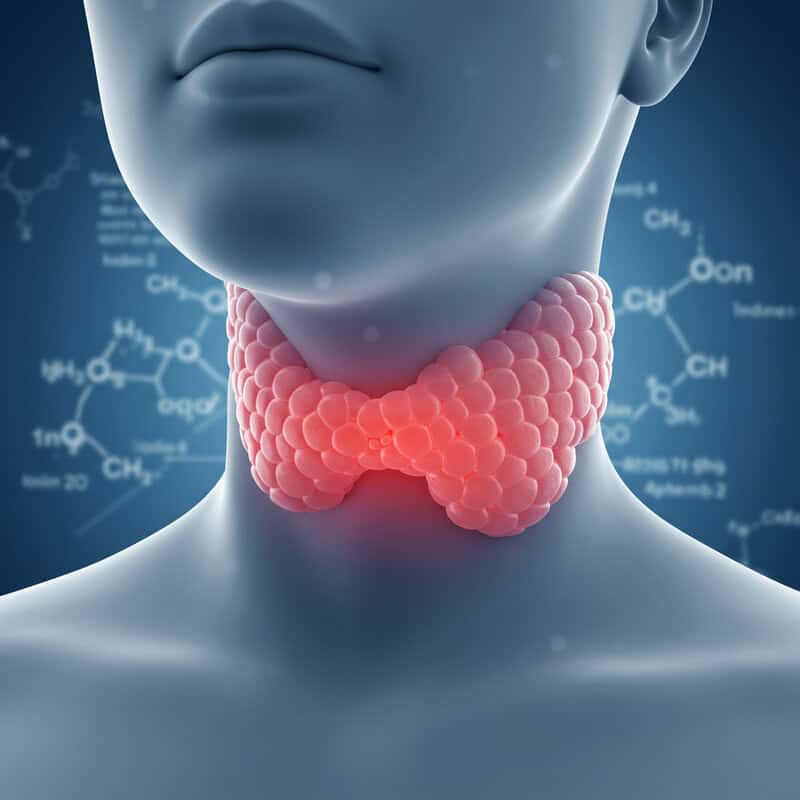
A swollen neck, often referred to as a goiter, is one of the most visible signs of thyroid dysfunction. A goiter occurs when the thyroid gland enlarges, either due to iodine deficiency, autoimmune thyroid disease (such as Hashimoto’s or Graves’ disease), or nodules within the gland. Historically, goiters were common in regions where diets lacked sufficient iodine, a crucial nutrient for thyroid hormone production. Today, iodized salt has greatly reduced the incidence in many countries, but goiters still occur due to autoimmune or other thyroid conditions.
In modern clinical practice, goiter may present as a noticeable swelling at the base of the neck, sometimes accompanied by tightness, difficulty swallowing, or changes in voice. For example, a woman described in a case study published by the National Institutes of Health noticed a gradual fullness in her neck. Initial tests revealed thyroid enlargement, and subsequent evaluation confirmed autoimmune thyroiditis as the underlying cause.
The American Thyroid Association stresses that new or persistent neck swelling should always be medically evaluated. Proper assessment can identify the cause, rule out malignancy, and ensure appropriate treatment to prevent complications.
17. Excessive Sweating

Excessive sweating is a hallmark symptom of an overactive thyroid, or hyperthyroidism. Thyroid hormones regulate the body’s metabolism and energy production, and when levels are elevated, the body’s metabolic rate increases. This heightened metabolic activity generates more internal heat, prompting the sweat glands to work overtime to cool the body. As a result, individuals with hyperthyroidism often experience persistent, profuse sweating—even in cool environments or during periods of rest.
This type of sweating is different from perspiration triggered by exercise, hot weather, nervousness, or spicy foods. For example, someone with hyperthyroidism may find themselves waking up with damp sheets, needing to change clothes frequently during the day, or feeling uncomfortably hot and sweaty when others are comfortable. In a review from StatPearls, patients reported that excessive sweating was often their first clue of thyroid imbalance, especially when accompanied by symptoms like rapid heartbeat, weight loss, or anxiety.
The American Thyroid Association recommends seeking medical advice if you experience ongoing, unexplained sweating, particularly if it persists regardless of environmental conditions. Early evaluation can help diagnose hyperthyroidism and prevent its potential complications.
18. Restlessness or Anxiety

Restlessness and anxiety are common psychological symptoms that can be directly influenced by thyroid hormone levels. Hyperthyroidism, or an overactive thyroid, floods the body with excessive thyroid hormones, overstimulating the nervous system. This can result in persistent feelings of unease, agitation, or panic that may not have an obvious external cause. Individuals often report racing thoughts, difficulty sitting still, and a constant sense of inner tension.
Unlike typical anxiety, which is often triggered by identifiable stressors or events, thyroid-related anxiety tends to be persistent and may occur alongside other physical symptoms such as palpitations, trembling, or unexplained weight loss. For example, a person may suddenly feel anxious and unable to relax, even in calm situations, or experience frequent panic attacks that are difficult to control. According to the Indian Journal of Endocrinology and Metabolism, these mental health changes can sometimes be the earliest or most prominent symptoms of thyroid dysfunction.
If you notice ongoing restlessness, unexplained anxiety, or mood swings—especially when accompanied by physical symptoms of thyroid imbalance—the American Thyroid Association advises discussing thyroid testing with your healthcare provider to identify or rule out a hormonal cause.
19. Irregular Heartbeat

Irregular heartbeat, or cardiac arrhythmia, can be a direct consequence of thyroid dysfunction—most commonly seen with hyperthyroidism, but sometimes also with hypothyroidism. Thyroid hormones significantly influence the heart’s electrical system, affecting both the speed and rhythm of heartbeats. Excess thyroid hormone (as in hyperthyroidism) can cause the heart to beat too quickly or erratically, leading to palpitations, skipped beats, or even atrial fibrillation, a serious type of arrhythmia. Conversely, low thyroid hormone levels (hypothyroidism) may slow the heart rate and, on rare occasions, cause irregular rhythms.
This differs from other common arrhythmia causes such as caffeine intake, anxiety, electrolyte imbalances, or underlying heart disease. For instance, a young adult experiencing sudden episodes of rapid, pounding heartbeats without any triggers such as stress or stimulants should consider a thyroid evaluation. The American Heart Association notes that new or persistent heart rhythm disturbances—especially when accompanied by symptoms like sweating, weight changes, or tremors—warrant prompt attention.
If you notice unexplained palpitations or irregular heartbeats, it is crucial to get an ECG (electrocardiogram) as soon as possible. This diagnostic tool, combined with thyroid function tests, can help determine the underlying cause and guide appropriate treatment.
20. Carpal Tunnel Symptoms
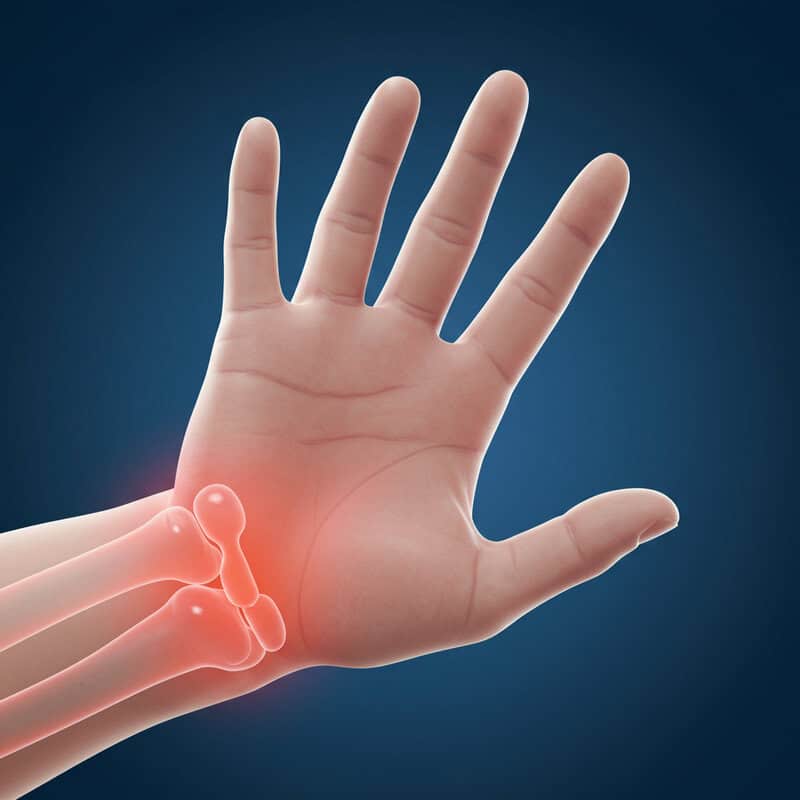
Carpal tunnel symptoms—such as numbness, tingling, or weakness in the hands and fingers—are often associated with repetitive wrist movements or occupational strain. However, these symptoms can also arise from hypothyroidism, which increases the risk of nerve compression. Low thyroid hormone levels can cause tissues in the wrist to swell and retain fluid, putting pressure on the median nerve that passes through the carpal tunnel. This leads to sensations similar to classic carpal tunnel syndrome, including nocturnal hand numbness, pain radiating up the arm, and reduced grip strength.
Unlike typical carpal tunnel syndrome, which usually develops gradually due to repetitive motion or injury, hypothyroid-related symptoms may appear unexpectedly and without a clear cause. For example, someone with no history of repetitive hand activities may begin waking with numb, tingling fingers or have trouble buttoning shirts. According to the Indian Journal of Endocrinology and Metabolism, carpal tunnel syndrome can sometimes be the first sign of undiagnosed hypothyroidism.
If you have persistent carpal tunnel symptoms that don’t improve with rest or ergonomic changes, the American Thyroid Association recommends thyroid function testing to check for an underlying hormonal imbalance that could be contributing to nerve compression.
21. Thinning Hair on Scalp

Thinning hair on the scalp is a common but often distressing symptom of thyroid dysfunction. Both hypothyroidism and hyperthyroidism can disrupt the normal growth cycle of hair follicles, resulting in diffuse hair loss across the entire scalp rather than in specific patches. This type of hair loss, known as telogen effluvium, occurs when more hairs than usual enter the resting (telogen) phase and subsequently fall out. Unlike pattern baldness—which is typically characterized by receding hairlines in men or widening part lines in women—thyroid-related hair loss presents as a general reduction in hair volume, leaving the scalp with a thinner, less dense appearance.
For example, someone with undiagnosed thyroid disease may notice more hair left in the shower drain or on their pillow, even with gentle hair care routines. This shedding can be particularly alarming and may occur alongside other symptoms such as fatigue, dry skin, or weight changes. According to the British Thyroid Foundation, if you experience persistent, unexplained hair thinning—especially when accompanied by other signs of thyroid imbalance—it is important to consult a healthcare professional for evaluation and blood tests.
Timely diagnosis and treatment of thyroid disorders can often reverse hair thinning and restore healthy hair growth over time.
22. Low Libido

Low libido, or decreased sexual desire, is a frequently overlooked symptom of thyroid dysfunction in both men and women. Thyroid hormones are deeply intertwined with the regulation of sex hormones such as estrogen and testosterone, impacting sexual health and arousal. When thyroid hormone levels are imbalanced—either too low (hypothyroidism) or too high (hyperthyroidism)—they can disrupt the body’s hormonal balance, leading to a reduced interest in sexual activity, difficulty achieving arousal, or issues with sexual satisfaction.
This is different from libido loss due to psychological factors such as stress, anxiety, or relationship issues, which often fluctuate with emotional changes or life circumstances. Thyroid-related low libido tends to persist even when psychological or environmental stressors are resolved and may be accompanied by physical symptoms like fatigue, weight changes, or menstrual irregularities. For example, a person treated for depression who continues to experience low sexual desire alongside other signs of thyroid imbalance may have an underlying hormonal issue.
The American Thyroid Association recommends considering thyroid function testing if you experience ongoing low libido, especially in conjunction with other symptoms. Identifying and correcting thyroid disorders can often restore sexual health and overall well-being.
23. Swelling of Hands or Feet

Swelling of the hands or feet can be a subtle yet telling sign of thyroid dysfunction, particularly hypothyroidism. When thyroid hormone levels are low, the body’s metabolism slows, leading to increased fluid retention and accumulation of mucopolysaccharides in the skin and soft tissues. This results in non-pitting edema—where pressing on the swollen area does not leave a dent—commonly seen around the hands, feet, and sometimes the lower legs. The swelling may be mild at first and worsen gradually, often accompanied by a feeling of heaviness or stiffness.
This type of fluid retention differs from other forms of edema, such as that caused by heart, kidney, or liver disease, which is typically pitting and may be associated with other symptoms like shortness of breath or reduced urine output. In thyroid-related edema, the swelling is often persistent and does not resolve with simple lifestyle changes.
The National Center for Biotechnology Information (NCBI) notes that swelling of the extremities, especially when unexplained and accompanied by fatigue, weight gain, or dry skin, should prompt thyroid testing. Consulting a healthcare provider ensures accurate diagnosis and appropriate treatment for underlying thyroid problems.
24. Difficulty Swallowing
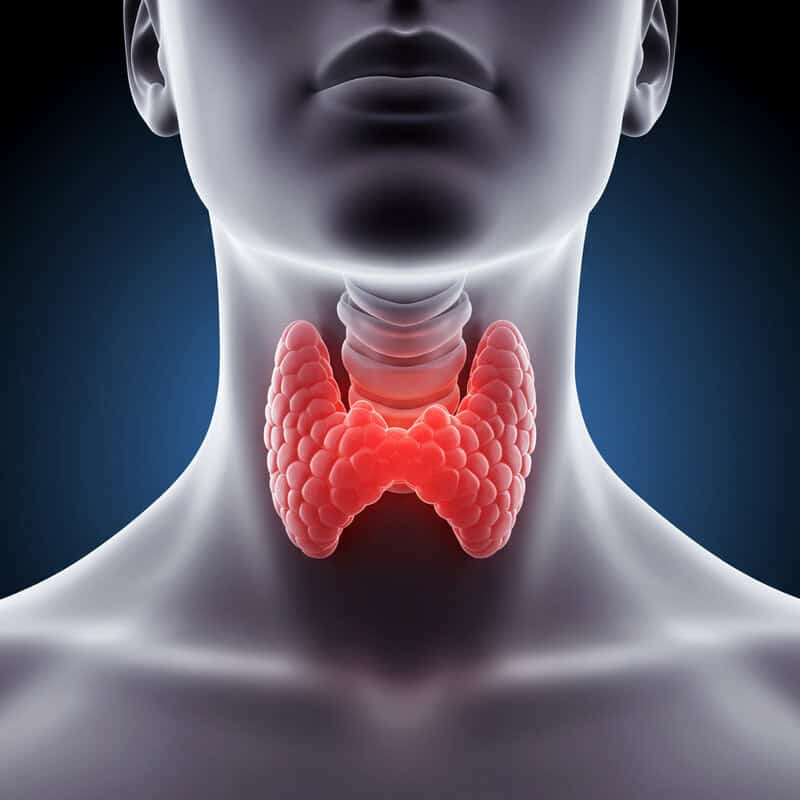
Difficulty swallowing (dysphagia) may develop when the thyroid gland becomes enlarged due to conditions such as goiter, thyroid nodules, or thyroiditis. The thyroid sits at the base of the neck, wrapped around the trachea and near the esophagus. When it becomes enlarged, it can exert pressure on the esophagus, making it harder to swallow solid foods, pills, or even liquids. This may progress slowly, and some individuals may first notice a sensation of “something stuck” in the throat or frequent coughing during meals.
For example, a patient described in a case report published by the National Institutes of Health experienced persistent swallowing difficulties and a visible neck swelling. Examination and imaging revealed a multinodular goiter compressing the esophagus. After thyroid surgery, the patient’s swallowing function returned to normal.
According to the American Thyroid Association, any new or worsening difficulty with swallowing—especially when associated with neck swelling, hoarseness, or unexplained weight loss—should prompt timely medical evaluation. Early assessment can identify the underlying cause, rule out serious conditions, and guide appropriate treatment to relieve symptoms and prevent complications.
25. Increased Appetite

Increased appetite is a classic yet sometimes overlooked symptom of hyperthyroidism, the condition of having an overactive thyroid. Elevated thyroid hormone levels accelerate the body’s metabolism, causing energy to be burned more quickly. As a result, individuals may feel hungry more often and crave larger or more frequent meals, despite maintaining their regular eating habits. Unlike emotional eating, which is typically triggered by stress, boredom, or mood changes, the hunger linked to hyperthyroidism is driven by physiological need and is often accompanied by other symptoms such as weight loss, nervousness, or insomnia.
For example, a person with newly developed hyperthyroidism may notice eating significantly more than usual but still losing weight or struggling to maintain their current weight. This paradox can be confusing and is often missed until other symptoms become more obvious. According to the National Institute of Diabetes and Digestive and Kidney Diseases, unexplained increases in appetite—especially when paired with weight loss or other thyroid-related signs—should prompt evaluation for thyroid dysfunction.
If you experience a persistent surge in hunger that is not explained by lifestyle or emotional factors, consult a healthcare provider for appropriate thyroid testing to ensure early diagnosis and treatment.
26. Irregular Sleep Patterns

Irregular sleep patterns are a common but often unrecognized sign of thyroid imbalance. Both hypothyroidism and hyperthyroidism can negatively impact sleep, though in different ways. Hyperthyroidism’s excess thyroid hormone can overstimulate the nervous system, causing insomnia, frequent awakenings, and difficulty falling or staying asleep. Sufferers may feel “wired but tired,” lying awake with a racing mind or waking up drenched in sweat. On the other hand, hypothyroidism can cause sleep disturbances due to symptoms like muscle cramps, joint pain, or a general sense of lethargy, sometimes leading to excessive sleeping or feeling unrefreshed after a full night’s rest.
This differs from primary insomnia, which is usually related to stress, anxiety, or poor sleep hygiene and often occurs without other physical symptoms. Thyroid-related sleep disruption tends to coincide with additional issues such as changes in energy levels, weight, or mood. For instance, someone with new sleep problems who also notices palpitations, anxiety, or fatigue may be experiencing a hormone-driven cause.
The Sleep Foundation recommends tracking your sleep with a journal or wearable device and discussing persistent changes with a healthcare provider. Comprehensive thyroid testing can help identify or rule out hormonal causes behind altered sleep patterns.
27. Lightheadedness or Dizziness
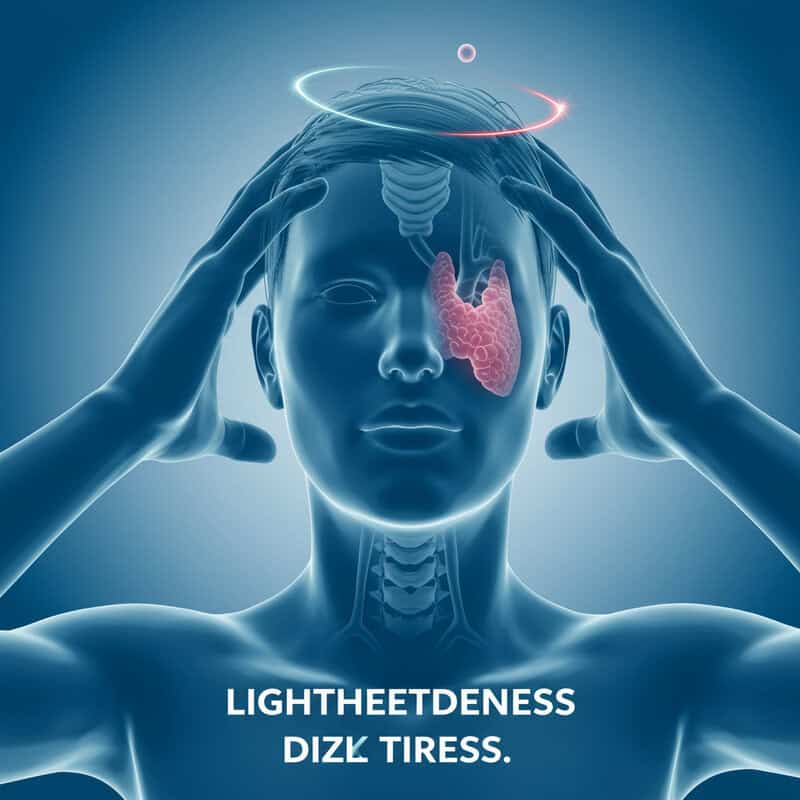
Lightheadedness or dizziness can be an underappreciated symptom of thyroid dysfunction, stemming from hormonal effects on the circulatory system. Thyroid hormones regulate heart rate, blood pressure, and vascular tone. In hypothyroidism, a slow heart rate and lower blood pressure can reduce blood flow to the brain, causing episodes of dizziness or a feeling of being faint, especially when standing up quickly. Hyperthyroidism, by contrast, may lead to heart palpitations and fluctuations in blood pressure, also resulting in sensations of vertigo or unsteadiness.
Imagine a scenario where a person suddenly feels woozy or off-balance when getting out of bed in the morning, despite being well hydrated and rested. They may also notice accompanying symptoms such as fatigue, irregular heartbeat, or unexplained weight changes. According to the National Institutes of Health, dizziness is not always related to dehydration or inner ear problems—thyroid dysfunction should be considered, especially if other unexplained symptoms are present.
If you experience recurrent or persistent dizziness, it’s important to consult a healthcare provider. The American Thyroid Association recommends thyroid testing for those with unexplained lightheadedness, particularly when it occurs alongside other signs of thyroid imbalance.
28. Chronic Fatigue
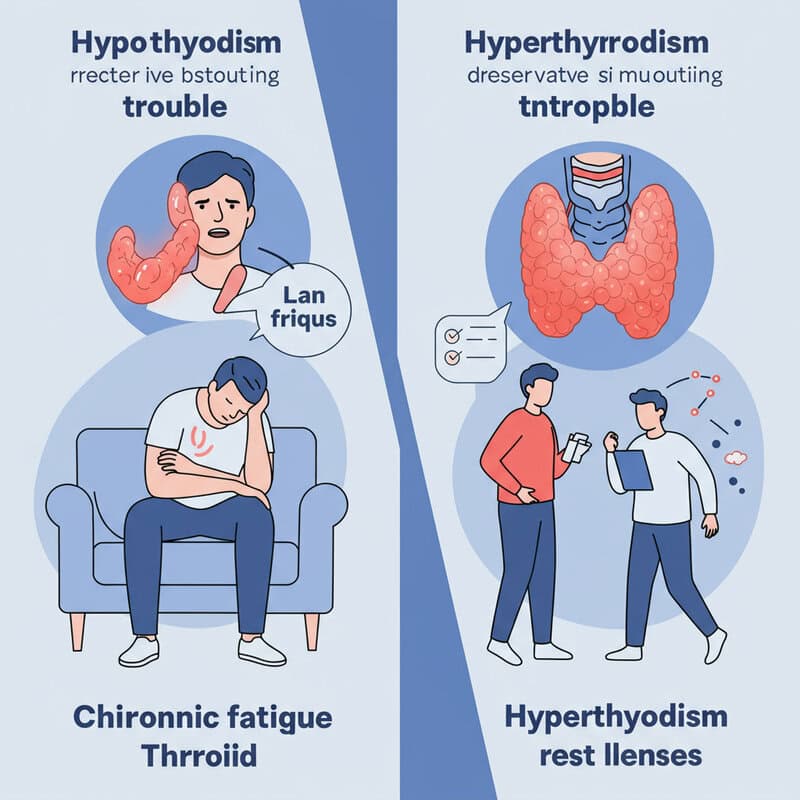
Chronic fatigue is a hallmark symptom of both hypothyroidism and hyperthyroidism, yet it is often mistaken for normal tiredness in today’s busy world. When the thyroid is underactive (hypothyroidism), metabolism slows, leading to persistent feelings of exhaustion, muscle weakness, and lack of motivation, regardless of sleep quality or duration. In contrast, an overactive thyroid (hyperthyroidism) can cause fatigue by overstimulating the body, resulting in restlessness, sleep disturbances, and eventual energy depletion from the constant metabolic overdrive.
This type of fatigue is distinct from typical tiredness, which usually improves with rest or after a good night’s sleep. Thyroid-related fatigue is relentless, often interfering with daily activities, work performance, and social life. For instance, someone with hypothyroidism may find it increasingly difficult to get out of bed in the morning or stay awake through the afternoon, even after adequate rest. Meanwhile, a person with hyperthyroidism may feel worn out but unable to relax or sleep soundly.
The American Thyroid Association recommends thyroid screening for anyone experiencing unexplained, persistent fatigue—especially when it coexists with other symptoms like weight changes, mood shifts, or hair loss—to ensure timely diagnosis and treatment.
29. Depressed Mood

Depressed mood is a significant but often overlooked manifestation of thyroid dysfunction, especially hypothyroidism. Thyroid hormones play a crucial role in brain chemistry and the regulation of neurotransmitters such as serotonin and dopamine, which directly influence emotional well-being. When thyroid hormone levels drop, individuals may experience persistent sadness, hopelessness, or a lack of interest in activities they once enjoyed.
For example, a patient described in a case study published by the National Institutes of Health sought help for ongoing depression that did not improve with counseling or antidepressant medication. Additional symptoms—such as weight gain, dry skin, and fatigue—prompted her physician to order thyroid testing, which revealed hypothyroidism. After starting thyroid hormone therapy, her mood gradually improved, highlighting the importance of considering physical causes for emotional symptoms.
The American Thyroid Association encourages individuals with persistent low mood, particularly if accompanied by physical symptoms of thyroid imbalance, to discuss thyroid screening with their healthcare provider. Early identification and treatment can alleviate both emotional and physical symptoms, improving overall quality of life.
30. Delayed Reflexes

Delayed reflexes are a classic neurological finding in individuals with untreated hypothyroidism. Thyroid hormones are essential for the proper transmission of signals along nerves and the normal functioning of muscles. When these hormones are deficient, nerve conduction slows, leading to sluggish or diminished reflex responses. This phenomenon is most commonly observed in the relaxation phase of the ankle jerk reflex, where the foot returns to its resting position more slowly after being tapped by a doctor’s reflex hammer.
Delayed reflexes due to hypothyroidism differ from other causes of sluggish reflexes, such as certain neurological disorders, vitamin deficiencies, or the effects of medications. In the context of thyroid dysfunction, this slowing is often accompanied by additional symptoms such as fatigue, cold intolerance, or muscle cramps. For example, a patient might notice increased clumsiness or slower reaction times, which can impact daily activities like driving or sports.
The National Center for Biotechnology Information (NCBI) notes that the presence of delayed reflexes, especially when found alongside other signs of hypothyroidism, should prompt further thyroid evaluation. Consulting a healthcare provider for assessment and simple blood tests can lead to timely treatment and resolution of neurological symptoms.
31. Unusual Hair Growth (Body/Face)

Unusual hair growth on the body or face can sometimes be a sign of thyroid dysfunction, particularly hyperthyroidism. Excess thyroid hormones can disrupt the balance of androgens (male hormones present in both men and women), which may lead to fine, soft hair growing on areas such as the face, arms, or back—a phenomenon known as hypertrichosis. This is distinct from hirsutism, which refers to coarse, male-pattern hair growth in women and is more commonly associated with conditions like polycystic ovary syndrome (PCOS) or adrenal disorders.
For example, an individual with hyperthyroidism may notice a sudden increase in light, downy hair on the cheeks or forearms that was not present before. Unlike the localized or patterned growth seen in androgen excess disorders, thyroid-related hair changes are often more diffuse and may be accompanied by other symptoms such as weight loss, rapid heartbeat, or anxiety. According to the Indian Journal of Dermatology, abnormal hair growth patterns should be evaluated in context with other clinical features to determine the underlying cause.
If you notice new or unusual body or facial hair growth—especially alongside signs of thyroid imbalance—the American Thyroid Association recommends consulting your healthcare provider for a thorough assessment and thyroid function testing.
32. Difficulty Climbing Stairs

Difficulty climbing stairs is a practical and often troubling symptom that can arise from muscle weakness associated with thyroid disease. Both hypothyroidism and hyperthyroidism can negatively affect muscle strength and endurance. Hypothyroidism tends to cause gradual muscle stiffness, cramping, and a sensation of heaviness, while hyperthyroidism often leads to the wasting of proximal muscles—those closest to the body’s core, like the thighs and shoulders. As a result, individuals may find everyday activities such as climbing stairs, rising from a chair, or lifting objects increasingly challenging.
For example, someone with undiagnosed hyperthyroidism may notice that their legs feel shaky or weak while ascending stairs, despite no recent changes in physical activity or injury. In contrast, a person with hypothyroidism might struggle with persistent soreness and fatigue in their thigh muscles, making climbing steps a slow, laborious task. According to the National Center for Biotechnology Information (NCBI), muscle symptoms that limit mobility and daily functioning, especially when not explained by overexertion or injury, warrant further investigation.
The American Thyroid Association advises that persistent muscle weakness or difficulty with activities like stair climbing should prompt thyroid function testing, especially if accompanied by other signs of thyroid imbalance.
33. Enlarged Tongue

Enlarged tongue, medically known as macroglossia, is a rare but noteworthy symptom of severe hypothyroidism. When thyroid hormone levels are significantly low, the body may accumulate mucopolysaccharides in soft tissues, causing them to swell. The tongue can become noticeably larger, leading to issues like speech difficulties, snoring, changes in voice quality, or even trouble swallowing. Macroglossia may also cause dental impressions to appear along the sides of the tongue due to its size pressing against the teeth.
A case study published in the Journal of International Oral Health described a woman who presented with persistent tongue swelling, along with fatigue and dry skin. Dental examination revealed classic signs of macroglossia, prompting further evaluation. Blood tests confirmed hypothyroidism, and her symptoms, including tongue swelling, improved significantly with thyroid hormone replacement therapy.
The American Thyroid Association emphasizes the importance of recognizing unusual oral symptoms as potential indicators of thyroid dysfunction. If you experience persistent tongue swelling, speech changes, or unexplained oral discomfort, it is important to consult a healthcare provider for a thorough evaluation and appropriate thyroid testing.
34. Slowed Heart Rate
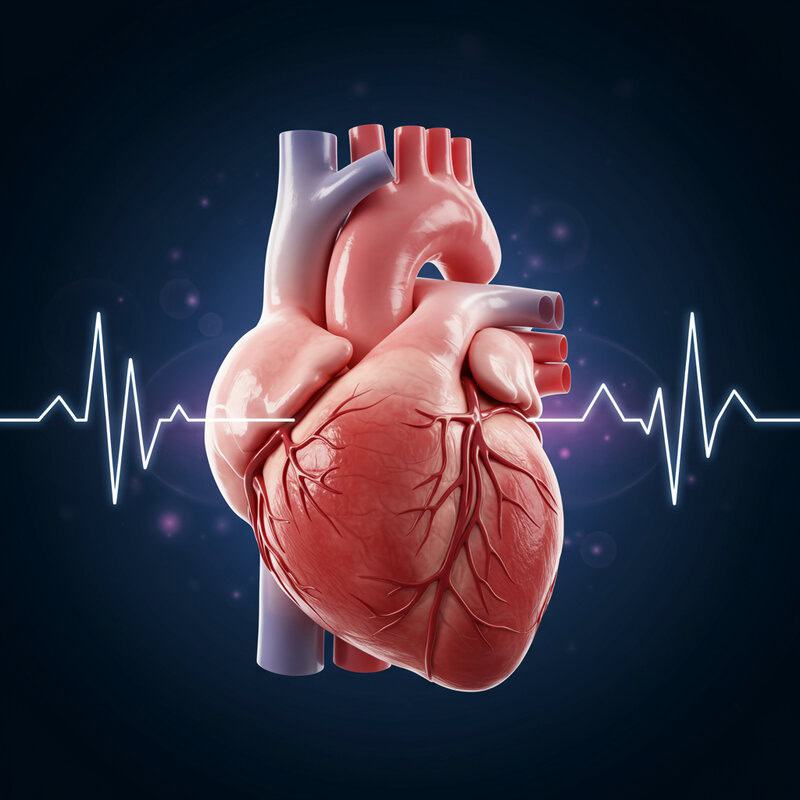
Slowed heart rate, or bradycardia, is a potential consequence of hypothyroidism. Thyroid hormones are essential for maintaining an appropriate heart rate and rhythm by stimulating the heart’s pacemaker cells. When thyroid hormone levels are low, the electrical impulses that regulate the heartbeat slow down, resulting in a resting heart rate that falls below the normal range (typically under 60 beats per minute in adults). This can lead to fatigue, dizziness, shortness of breath, and even fainting in severe cases.
It’s important to distinguish bradycardia caused by hypothyroidism from the slow heart rates seen in well-conditioned athletes. Athletic bradycardia is a healthy adaptation to regular exercise, allowing the heart to pump more efficiently. In contrast, hypothyroid-related bradycardia is usually accompanied by other symptoms such as weight gain, cold intolerance, and muscle weakness, and does not reflect enhanced cardiovascular fitness.
The National Center for Biotechnology Information (NCBI) notes that unexplained bradycardia should always be evaluated, especially if it appears alongside other signs of hypothyroidism. The American Heart Association recommends getting an ECG and thyroid function tests to determine the underlying cause and guide treatment.
35. Increased Sensitivity to Medications
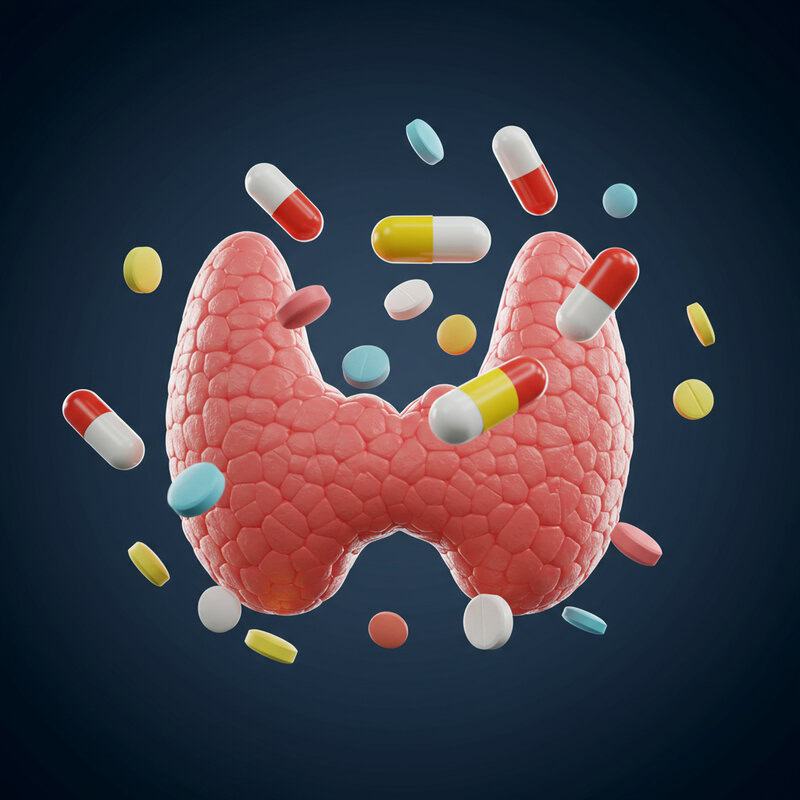
Increased sensitivity to medications is an often-overlooked sign of thyroid dysfunction. Thyroid hormones play a critical role in the body’s metabolism, including how drugs are processed in the liver and excreted by the kidneys. Low thyroid function (hypothyroidism) slows metabolic processes, causing medications to linger longer in the body and increasing the risk of side effects or toxicity. Hyperthyroidism, on the other hand, can accelerate drug metabolism, sometimes making standard doses less effective. Individuals may notice heightened reactions to sedatives, blood thinners, or cardiovascular drugs, even at usual dosages.
For instance, someone with undiagnosed hypothyroidism might begin a new prescription for a common medication and experience excessive drowsiness, low blood pressure, or other side effects out of proportion to the dose. According to an article in StatPearls, this altered drug sensitivity is especially important in the elderly or those taking multiple medications, as adverse reactions can be more pronounced and potentially dangerous.
The American Thyroid Association recommends informing your healthcare provider about any unusual reactions to new prescriptions. If you experience unexpected side effects or medication intolerance, thyroid function testing should be considered as part of the evaluation.
36. Yellowish Skin Tone

Yellowish skin tone is a lesser-known symptom of hypothyroidism and is often caused by a condition called carotenemia. In hypothyroidism, the metabolism of beta-carotene—commonly found in carrots, sweet potatoes, and other orange vegetables—is slowed due to reduced thyroid hormone activity. As a result, excess beta-carotene accumulates in the bloodstream and is deposited in the skin, giving it a yellowish hue, especially on the palms and soles. Unlike jaundice, which is characterized by yellowing of both the skin and the whites of the eyes due to elevated bilirubin levels from liver dysfunction, carotenemia spares the eyes and is otherwise harmless.
For example, a patient with untreated hypothyroidism may notice their palms gradually turning yellow, despite no significant dietary changes. This finding, combined with fatigue or weight gain, often prompts further investigation. According to a review in the Indian Journal of Dermatology, carotenemia should be considered in patients with unexplained yellow skin, especially if liver tests are normal and other symptoms of hypothyroidism are present.
If you develop a persistent yellowish skin tone without eye discoloration or liver issues, it is important to seek medical evaluation. Thyroid function testing can help distinguish carotenemia from more serious causes of skin color changes and guide proper treatment.
37. Eye Changes (Bulging or Dryness)

Eye changes such as bulging or dryness are notable symptoms of thyroid dysfunction, particularly in the context of Graves’ disease—a form of hyperthyroidism. Thyroid eye disease, also called Graves’ ophthalmopathy, occurs when the immune system attacks tissues around the eyes, leading to inflammation and swelling. This can cause the eyes to appear more prominent or “bulging” (proptosis), along with symptoms like redness, irritation, tearing, and light sensitivity. In more severe cases, double vision or difficulty closing the eyes may develop.
While dry eyes are commonly caused by prolonged screen use, aging, or environmental factors, thyroid-related eye changes are often more persistent and pronounced. For example, someone may notice their eyes look unusually prominent in photos, or they may develop chronic irritation that does not improve with over-the-counter lubricating drops. According to the American Academy of Ophthalmology, these symptoms can also occur in patients with hypothyroidism, though bulging is more characteristic of hyperthyroidism.
If you experience new or worsening eye symptoms—such as bulging, persistent dryness, or vision changes—the American Thyroid Association recommends consulting both your healthcare provider and an eye specialist for thorough evaluation and management.
38. Increased Bowel Movements

Increased bowel movements, including diarrhea or unusually frequent stools, can be a direct result of hyperthyroidism. Excess thyroid hormones speed up metabolism, including the movement of food through the digestive tract. This accelerated gut motility often leads to more frequent, looser stools and, in some cases, outright diarrhea. Unlike gastrointestinal infections, which are typically accompanied by fever, abdominal pain, or blood in the stool, thyroid-driven changes in bowel habits are usually persistent and not linked to contaminated food or recent illness.
For example, an individual with undiagnosed hyperthyroidism may notice a need to visit the bathroom several times a day, sometimes with urgency, even when following a normal diet. The stools are often soft but not associated with the acute discomfort typical of infections. According to the National Institute of Diabetes and Digestive and Kidney Diseases, frequent stools or new-onset diarrhea—especially when accompanied by other symptoms like weight loss, anxiety, or tremors—should raise suspicion for thyroid dysfunction.
Red flags that warrant prompt evaluation include persistent diarrhea, dehydration, unexplained weight changes, or symptoms of thyroid storm (severe hyperthyroidism). In such cases, thyroid testing and medical review are strongly recommended.
39. Voice Deepening
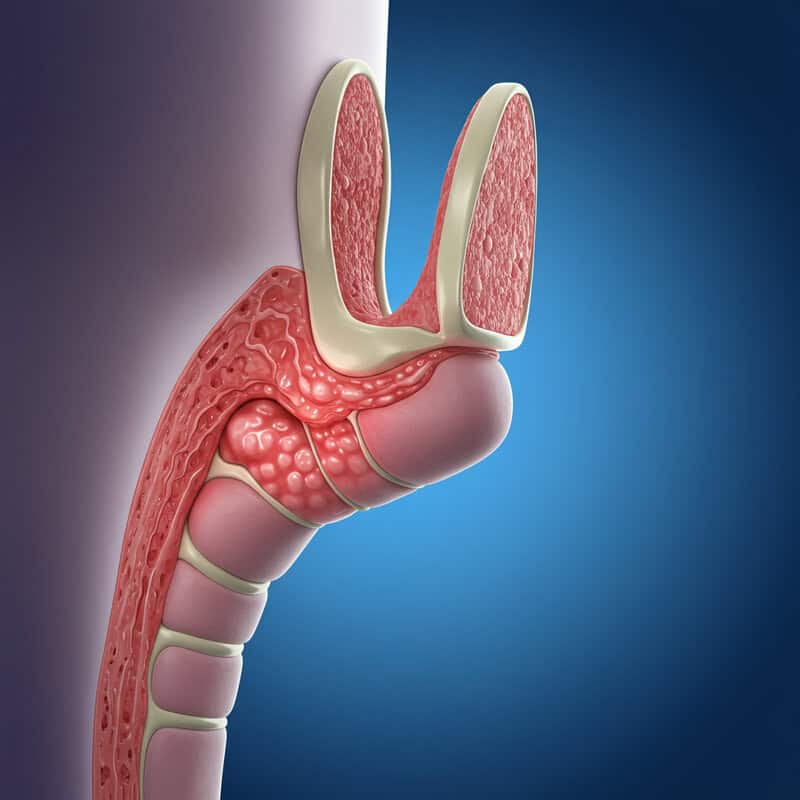
Voice deepening is an uncommon but distinctive symptom of hypothyroidism. Low thyroid hormone levels lead to the accumulation of mucopolysaccharides and fluid in the tissues of the larynx (voice box) and vocal cords, causing them to thicken and swell. This results in a deeper, huskier, or more hoarse-sounding voice—a change that may develop gradually and often goes unnoticed until remarked upon by others. The deepening may be persistent and does not typically fluctuate with daily voice use or fatigue.
Voice changes can have various causes, including vocal strain, respiratory infections, smoking, or benign growths on the vocal cords. However, when accompanied by other symptoms of hypothyroidism—such as fatigue, weight gain, or dry skin—thyroid dysfunction should be considered. For instance, a person who experiences a gradual deepening of their voice along with increasing lethargy and facial swelling may be exhibiting classic signs of low thyroid function.
The Journal of Neurosciences in Rural Practice documents cases where voice deepening was resolved following thyroid hormone replacement. If you notice a persistent change in the quality or pitch of your voice, especially when accompanied by other thyroid-related symptoms, consult your healthcare provider for a thorough assessment and thyroid function tests.
40. Loss of Interest in Usual Activities

Loss of interest in usual activities, also known as apathy or anhedonia, can be a significant yet often overlooked symptom of thyroid hormone imbalances. Both hypothyroidism and, less commonly, hyperthyroidism can disrupt the brain’s neurotransmitter systems, resulting in reduced motivation, enthusiasm, and pleasure in daily life. Unlike normal fluctuations in interest that may coincide with stress or temporary mood changes, thyroid-related apathy tends to be persistent and difficult to overcome, even when circumstances improve.
For example, imagine a person who previously enjoyed hobbies like gardening, reading, or socializing but suddenly finds these activities unappealing and struggles to muster the energy to participate. This scenario often occurs alongside other symptoms of thyroid dysfunction, such as fatigue, weight changes, or cognitive difficulties. According to the National Institutes of Health, apathy and loss of motivation are common in patients with untreated hypothyroidism and can mimic signs of depression.
The American Thyroid Association suggests tracking changes in motivation and discussing them with a healthcare provider, especially if they persist for several weeks or are accompanied by other physical or emotional changes. Thyroid testing can help identify a hormonal cause and guide effective treatment.
41. Numbness or Tingling in Extremities
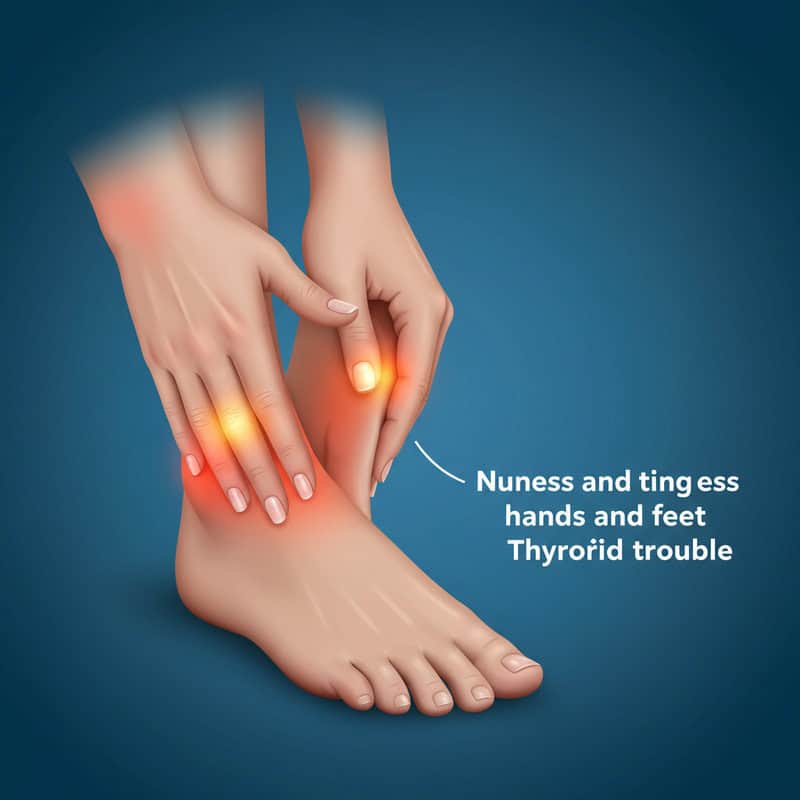
Numbness or tingling in the hands, feet, or other extremities can be a direct result of thyroid dysfunction, particularly hypothyroidism. Low thyroid hormone levels can lead to the accumulation of fluid and mucopolysaccharides in tissues, which may compress peripheral nerves and disrupt normal nerve signaling. Over time, this can cause sensations of numbness, tingling, or “pins and needles,” especially in the fingers and toes. These symptoms may develop gradually and can occur on both sides of the body.
While numbness and tingling are common in other conditions—such as diabetes (diabetic neuropathy), vitamin B12 deficiency, or carpal tunnel syndrome—thyroid-related neuropathy typically presents with additional symptoms of hypothyroidism, such as fatigue, muscle weakness, and cold intolerance. For example, someone with undiagnosed thyroid disease might notice persistent tingling in their feet and hands that does not improve with rest or positional changes.
The National Institutes of Health highlights that unexplained peripheral neuropathy should prompt thyroid function testing. If you experience ongoing numbness or tingling, especially if it worsens or is associated with other neurological signs, the American Thyroid Association recommends consulting a neurologist and undergoing a full evaluation for underlying thyroid or other medical conditions.
42. Swollen Lymph Nodes
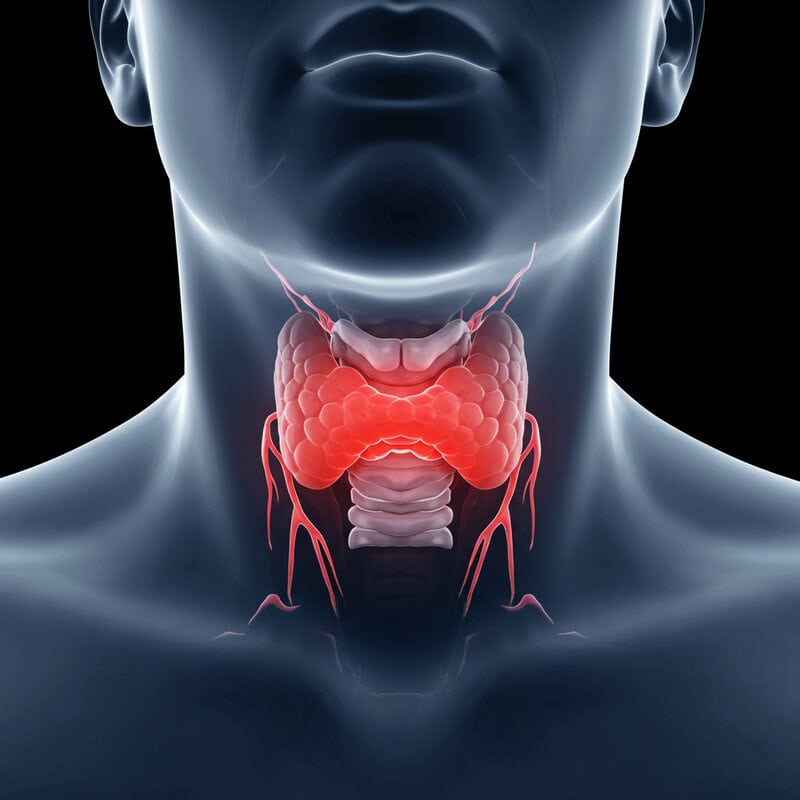
Swollen lymph nodes in the neck can sometimes occur in association with thyroid disease, particularly in cases of thyroiditis or autoimmune thyroid conditions such as Hashimoto’s disease and, less commonly, Graves’ disease. Inflammation or immune system activity in and around the thyroid gland can cause the nearby lymph nodes to enlarge as they respond to the underlying process. This swelling is typically mild to moderate and may be discovered incidentally during a physical exam or while checking for other neck symptoms.
Swollen lymph nodes from thyroid disease differ from those related to infections, which are often accompanied by tenderness, redness, fever, and rapid onset. Infection-related nodes usually resolve once the infection clears, while those due to thyroid dysfunction can persist or fluctuate over time and are generally not painful. For example, a person with Hashimoto’s thyroiditis might notice small, firm nodules in the neck for weeks or months without other signs of infection.
The American Thyroid Association recommends monitoring any new or persistent neck swelling. If swollen lymph nodes are accompanied by symptoms such as unexplained weight loss, night sweats, or rapidly enlarging masses, or are present for more than a few weeks, further evaluation—including thyroid and lymph node assessment—should be undertaken by a healthcare provider.
43. Excessive Sleepiness During the Day

Excessive sleepiness during the day is a common yet often underappreciated symptom of thyroid dysfunction, especially hypothyroidism. When thyroid hormone levels are low, the body’s metabolism slows dramatically, leading to persistent fatigue and an overwhelming urge to nap or rest throughout the day. This sleepiness can occur even after a full night’s rest and may interfere with work, school, or daily activities. In some cases, individuals report falling asleep during meetings, while reading, or even while watching television.
Daytime sleepiness from thyroid dysfunction is different from sleepiness due to sleep apnea, which is caused by repeated interruptions in breathing during sleep and is often accompanied by loud snoring or gasping. While sleep apnea leads to poor sleep quality and similar daytime fatigue, thyroid-related sleepiness is usually accompanied by other signs such as weight gain, cold intolerance, dry skin, or muscle weakness. For example, someone with untreated hypothyroidism may find that they need multiple naps each day, despite no evidence of disrupted sleep at night.
The Sleep Foundation and the American Thyroid Association recommend considering thyroid screening for anyone with persistent, unexplained daytime sleepiness, particularly if it occurs alongside other classic symptoms of thyroid imbalance.
44. Changes in Taste or Smell

Changes in taste or smell can be subtle but telling signs of thyroid disease, particularly in cases of hypothyroidism or autoimmune thyroiditis. Thyroid hormones contribute to the maintenance and regeneration of sensory nerve cells. When hormone levels are imbalanced, these nerves may become less responsive, resulting in a reduced or altered sense of taste (dysgeusia) or smell (hyposmia or anosmia). Individuals might notice foods tasting bland, metallic, or different than usual, or find it difficult to detect familiar scents.
These sensory disturbances differ from changes caused by common colds, nasal allergies, or COVID-19, which usually have a rapid onset and are often accompanied by congestion, fever, or other respiratory symptoms. Thyroid-related changes tend to develop gradually and may persist even after other temporary conditions resolve. For example, someone with hypothyroidism might gradually lose interest in favorite foods or find that perfumes and household odors become less noticeable.
According to the Journal of Clinical Medicine, persistent changes in taste or smell—especially when accompanied by other symptoms like fatigue, weight changes, or hair loss—should be discussed with a clinician. The American Thyroid Association recommends thyroid function testing when sensory changes remain unexplained by other causes.
45. Weak or Slowed Pulse

Weak or slowed pulse is a notable cardiovascular manifestation of hypothyroidism. Thyroid hormones are essential for stimulating the heart’s activity and maintaining normal circulation. When thyroid hormone levels are low, the heart contracts less forcefully and at a slower rate, resulting in a weak or bradycardic pulse—often below 60 beats per minute in adults. This reduction in cardiac output can lead to symptoms such as fatigue, dizziness, exercise intolerance, and, in severe cases, fainting or near-fainting episodes.
For example, a person with unrecognized hypothyroidism may visit their doctor for persistent tiredness and find their pulse is consistently lower than expected, even while at rest. Unlike athletes, whose slow pulse is a result of cardiovascular fitness, a hypothyroid patient’s bradycardia is typically accompanied by cold intolerance, dry skin, or swelling. According to the National Center for Biotechnology Information (NCBI), a weak or slowed pulse in the context of other thyroid symptoms should prompt thyroid function testing.
If you notice a persistently low or weak pulse—especially when paired with symptoms like dizziness, chest discomfort, or shortness of breath—the American Heart Association advises seeking medical evaluation to rule out hypothyroidism and other potential heart conditions.
46. Unsteady Gait

Unsteady gait—difficulty maintaining balance or a feeling of unsteadiness while walking—can be a manifestation of thyroid dysfunction, particularly in cases of untreated hypothyroidism or severe hyperthyroidism. Thyroid hormones are crucial for normal nerve and muscle function. When hormone levels are imbalanced, coordination and muscle strength can be impaired, leading to subtle changes in walking patterns, frequent stumbling, or a wide-based, shuffling gait. These symptoms may develop gradually and can be mistaken for aging or benign clumsiness.
Unlike balance issues caused by inner ear disorders, stroke, or certain neurological diseases (such as Parkinson’s or multiple sclerosis), thyroid-related gait disturbances are often accompanied by other signs of hormonal imbalance such as muscle cramps, numbness, fatigue, or cognitive changes. For example, an older adult with undiagnosed hypothyroidism might start walking more slowly and carefully to avoid falls, or feel less steady on uneven surfaces, without any clear cause.
The National Institutes of Health notes that unexplained changes in gait—especially when associated with other thyroid symptoms—should prompt further evaluation. The American Thyroid Association recommends monitoring for persistent or worsening balance problems, as timely diagnosis and treatment can often reverse these neurological effects.
47. Increased Risk of Miscarriage

Increased risk of miscarriage is a serious concern associated with thyroid dysfunction during pregnancy. Thyroid hormones are essential for normal fetal development, especially in the first trimester when the baby’s thyroid gland is not yet fully functional. Studies have shown that both hypothyroidism and hyperthyroidism, if left untreated, can significantly raise the risk of miscarriage, premature birth, and other complications. According to the Journal of Thyroid Research, women with untreated hypothyroidism are at a two to three times higher risk of first-trimester miscarriage compared to those with normal thyroid function.
For example, a woman with a history of recurrent early pregnancy losses underwent thyroid screening and was diagnosed with subclinical hypothyroidism. After starting thyroid hormone therapy, she successfully carried her next pregnancy to term. This case underscores the importance of identifying and managing thyroid issues before and during pregnancy.
The American Thyroid Association recommends preconception thyroid screening for women with a history of miscarriage, infertility, or symptoms of thyroid disease. Early detection and treatment can improve pregnancy outcomes and help ensure the health of both mother and baby.
48. Shortness of Breath
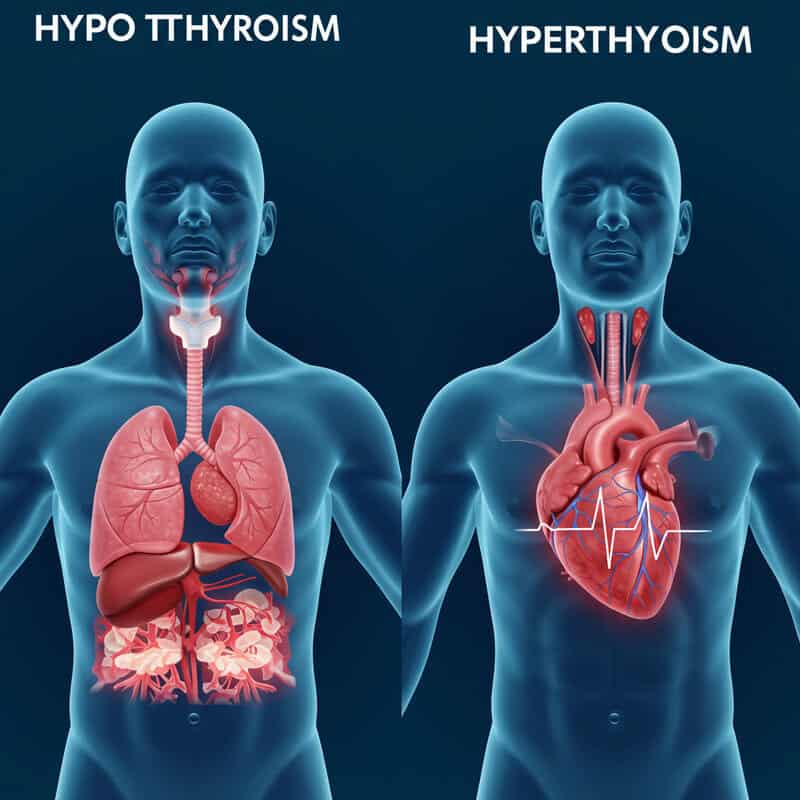
Shortness of breath is a sometimes overlooked symptom of thyroid disease, affecting both hypothyroid and hyperthyroid patients. In hypothyroidism, weakened respiratory muscles and fluid retention can impair breathing, making physical exertion challenging and sometimes leading to a sense of “air hunger.” Hyperthyroidism, on the other hand, can increase the metabolic rate, causing the heart to work harder and sometimes precipitating rapid, shallow breathing or even heart failure, which further limits oxygen delivery to tissues.
This symptom differs from shortness of breath due to primary lung diseases such as asthma, COPD, or infections, which are often accompanied by cough, wheezing, or chest congestion. Thyroid-related breathing difficulties typically co-occur with other features like fatigue, swelling, palpitations, or unexplained weight changes. For instance, a patient with untreated Graves’ disease (hyperthyroidism) might feel winded after climbing a single flight of stairs, despite no known lung or heart conditions.
The American Thyroid Association and National Institutes of Health advise seeking urgent medical attention for sudden or severe shortness of breath, chest pain, or fainting, and to discuss persistent mild symptoms with a healthcare provider for thyroid evaluation and appropriate management.
49. Decreased Sweating

Decreased sweating is a subtle but significant symptom of hypothyroidism. Thyroid hormones play a critical role in regulating body temperature and stimulating sweat glands. When hormone levels are low, the skin’s ability to produce sweat diminishes, leading to dry, cool skin even in warm environments or during physical activity. This reduction in sweat production can be accompanied by other symptoms such as fatigue, weight gain, and intolerance to cold.
Unlike normal variations in sweating—where some people naturally sweat less due to genetics, climate, or hydration status—hypothyroidism-related decreased sweating usually represents a marked change from a person’s baseline and is often associated with other signs of thyroid dysfunction. For example, someone who previously perspired during exercise may suddenly notice little to no sweat, despite exertion or high temperatures. This can also contribute to skin problems, such as itchiness or thickening.
The National Center for Biotechnology Information (NCBI) notes that a noticeable drop in sweating, along with persistent dry skin or other unexplained symptoms, should prompt consideration of thyroid testing. The American Thyroid Association recommends discussing any significant or persistent changes in sweat patterns with a healthcare provider.
50. Difficulty Losing Weight

Difficulty losing weight is a common complaint among individuals with hypothyroidism. Thyroid hormones are fundamental to regulating the body’s metabolic rate—the speed at which calories are burned for energy. When thyroid hormone levels are low, metabolism slows, resulting in the body burning fewer calories at rest and during activity. This can make weight loss efforts frustratingly ineffective, even when maintaining a healthy diet and regular exercise routine. Accompanying symptoms might include fatigue, constipation, and cold intolerance.
It’s important to distinguish between weight loss challenges caused by lifestyle factors—such as overeating, sedentary habits, or stress—and those rooted in thyroid dysfunction. In hypothyroidism, the inability to shed pounds often persists despite diligent adherence to calorie restriction and physical activity. For example, a person may find that their weight remains unchanged or even increases, regardless of how much they adjust their diet or intensify their workouts.
The National Institute of Diabetes and Digestive and Kidney Diseases and the American Thyroid Association recommend thyroid function testing for anyone who struggles with unexplained weight loss resistance, particularly when it is accompanied by other signs of hypothyroidism. Early diagnosis and treatment can help restore metabolic balance and support more effective weight management.
Conclusion
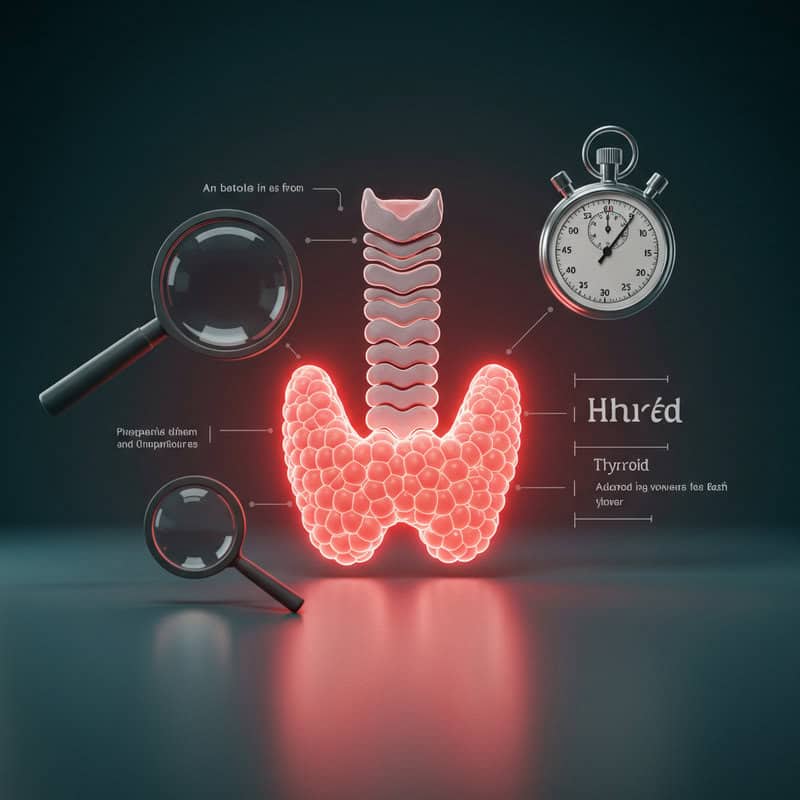
Recognizing unusual symptoms of thyroid dysfunction is crucial for early intervention and improved health outcomes. Because thyroid disorders can present in subtle or unexpected ways, timely screening is essential—especially when symptoms persist or defy obvious explanation. If you or someone you know is experiencing multiple, ongoing changes in energy, mood, weight, or physical health, consult a healthcare provider about thyroid testing. Early diagnosis can often prevent complications and support a return to well-being. For more information on thyroid disorders and screening, visit the American Thyroid Association or review guidance from the National Institute of Diabetes and Digestive and Kidney Diseases.
Disclaimer
The information provided in this article is for general informational purposes only. While we strive to keep the information up-to-date and correct, we make no representations or warranties of any kind, express or implied, about the completeness, accuracy, reliability, suitability, or availability with respect to the article or the information, products, services, or related graphics contained in the article for any purpose. Any reliance you place on such information is therefore strictly at your own risk.
In no event will we be liable for any loss or damage including without limitation, indirect or consequential loss or damage, or any loss or damage whatsoever arising from loss of data or profits arising out of, or in connection with, the use of this article.
Through this article you are able to link to other websites which are not under our control. We have no control over the nature, content, and availability of those sites. The inclusion of any links does not necessarily imply a recommendation or endorse the views expressed within them.
Every effort is made to keep the article up and running smoothly. However, we take no responsibility for, and will not be liable for, the article being temporarily unavailable due to technical issues beyond our control.





